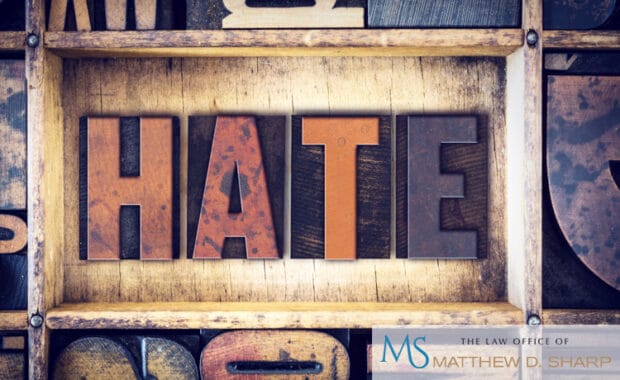Texas Hate Crime Laws
In Texas, crimes are prosecuted based on their degree of severity relative to other crimes as well as to moral standards. For example, a planned and premeditated murder is considered much more serious than a killing that resulted from a sudden and unplanned brawl. Both crimes are punished harshly but one is considered more heinous than the other and deserving of tougher punishment.
Similarly, some crimes can be upgraded to a more serious penalty category if they are done for the purpose of hate or intimidation or if they target a specific group. These crimes are considered hate crimes and they fall into a special penalty category under Texas law.
What Is A Hate Crime?
Many different types of crimes can be labeled hate crimes if they meet a certain set of criteria. Essentially, a typical crime can be upgraded to a hate crime if it targets or is carried out against a person or group of people because of their status.
For example, if a person approaches a random stranger on the street and picks a fight, the aggressor may be charged with disturbing the peace and aggravated assault. However, if the aggressor is a Neo-Nazi who picks a fight with an African-American, there may be grounds to label the assault as a hate crime.
A hate crime can take many forms. Common hate crimes include:
- Murder
- Assault
- Arson
- Armed robbery
- Harassment
- Stalking
- Rape
- Vandalism
Most hate crimes are somewhat violent in nature. They may target a wide group of people or one individual. Hate crime motivations may be based on:
- Race
- Religious affiliation
- Sexual orientation
- Gender identity
- Political affiliation
- Economic status
- Disability
- Age
A crime may be labeled a hate crime after law enforcement has conducted an investigation. If the investigation determines that a crime was committed on the basis of bias or discrimination, the offense may be labeled a hate crime.
Common Victim Groups
In most, but certainly not all, cases, the victims of hate crimes are members of minority groups. Sometimes, people who are committed to an ideology that shuns, rejects or targets a minority group may carry out an attack against that group’s members. A historical example is the firebombing of African-American churches by Ku Klux Klan members and white supremacists during the civil rights movement of the 1960s.
Some groups that are commonly victims of hate crimes include:
- Black, Latino or Asian people
- People who identify as LGBTQ or people who are perceived to be gay, bisexual, lesbian or transgender
- Homeless people
- People with physical or mental disabilities
- The elderly
- Immigrants
It should be noted that these groups do not constitute the only groups that are victimized by hate crimes. Any person may be a victim of a hate crime if they are targeted because of their race, ethnicity, economic status, sexual orientation, age or gender identity. However, the groups listed here represent some of the most commonly targeted groups.
Legal Penalties
The criminal penalty for a hate crime is determined by a variety of factors. As with most crimes, the penalty for a hate crime is influenced by the motivation for the crime, the use of force or weapons and the eventual outcome of the crime.
In most cases, a crime that is determined to be a hate crime may be subject to additional or enhanced penalties. That is to say, there may be extra punishments added on to the original sentence or the punishments handed down may be enhanced or lengthened.
For example, a person who might be sentenced to community supervision and anger management courses for a simple assault may be sentenced to jail time for a similar event that was motivated by bias or prejudice.
Hate crime punishments can include:
- Additional time in jail or prison
- Mandatory anger management treatment
- Mandatory restitution to the victims
- Additional financial penalties
Essentially, hate crime laws serve to fight back against hate crimes by making the punishments for these offenses more severe and lengthy when compared to the punishments for non-prejudice based offenses.
Legal Defense
A defense attorney may fight back against charges of a hate crime by arguing that the crime was not motivated by prejudice or bias. Because the only difference between a standard offense and a hate crime offense is the element of prejudice, this will likely be the primary point of contention in the defense’s case.
For example, if a person is brought up on charges for getting into a fight with a member of a racial minority, the attorney may argue that the defendant was under extreme emotional stress and that he was provoked by an insult from the victim. If the attorney can convince the jury that the crime was not the result of racial prejudice, the additional hate crime charges may be dropped.
Do you know someone that is being charged with a hate crime? Attorney Matthew Sharp can help develop a strong legal defense to make sure that their rights are protected. Contact his office today at 713-868-6100.




